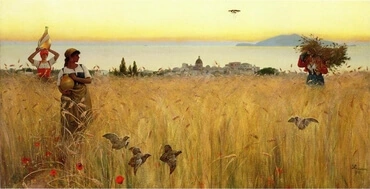Arcana Coelestia #487
487. 'Days means periods of time and states in general. This has been shown in Chapter 1, where the 'days of creation' have no other meaning. In the Word it is very common for a whole period of time to be called 'a day', as it clearly is in the present verse and in verses 5, 8, 11, 14, 17, 20, 23, 27, 31, below; and therefore the states that belong to periods of time in general are meant by 'days' as well. And when 'years' is attached, then periods of years mean the natures of those states, and so the states in particular.
[2] The most ancient people had their own particular numbers which they would use to mean different aspects of the Church - for instance, the numbers three, seven, ten, twelve, and many which they obtained from these and other numbers - and in so doing incorporated states of the Church. These numbers therefore contain arcana that would require considerable effort to unravel. Really a number was an evaluation of the states of the Church. The same feature occurs throughout the Word, especially in the prophetical. And the religious ceremonies of the Jewish Church also entail numbers specifying periods of time as well as quantities; for example, in connection with sacrifices, minchahs, oblations, and other practices, which in every case have special reference to holy things. Consequently eight hundred in this verse, nine hundred and thirty in the next, and the numbers of years mentioned in the verses that follow after that, embody in particular more matters than can possibly be retold; matters, that is to say, which have to do with changes in the state of their Church in relationship to their own general state. Later on, in the Lord's Divine mercy, the meaning of the simple numbers up to twelve will be given, for without knowing these first of all no one can grasp what compound numbers mean.
Corn or grain

The word “corn” can be a bit tricky when looking at spiritual meanings, because there are two different Hebrew words with different meanings which are both often translated as “corn.” The Hebrew dawgawn is used to mean grain in general, and shehber is used to mean food that is for sale, or that is shared in common. Shehber refers to true ideas that sustain us in times of spiritual need. You can read more about that at the entry on corn/rations. Dawgawn, or “grain,” in a general sense represents the desire to be good, the energy to do what is good and the actual good we can do – things that are loving and caring toward others and ultimately toward the Lord. This makes sense; grains are a primary source of energy in our diets; most of our actions are in a sense “grain-powered.” Spiritual grain gives us energy for spiritual work just as natural grain gives us energy for natural work. The precise meaning varies depending on context, from simple good that comes from obedience to higher good works that arise from love and wisdom. Grain that is still growing represents religious beliefs that will lead to good. And when the grain comes from the highest sources – Joseph, for instance, who represents love from the Lord – it represents the true ideas that spring naturally from love, and which contain love.
'Corn,' as in Genesis 42:2, here stands for a word in the original language that meant 'breaking' as well as a similar word meaning to buy or sell. This is shown in the context of Jacob's sons buying corn in Egypt and Joseph selling it there. The reason for this is that in the Ancient Church bread was broken when it was given to another, which meant the sharing of what was one's own and the passing of good from oneself to another. When someone breaks bread and gives it to another, he is sharing with him what is his own. This makes it clear that 'breaking bread' was a sign of mutual love. Because this had become an accepted and customary practice in the Ancient Church, 'breaking' referred to the common availability of corn.






